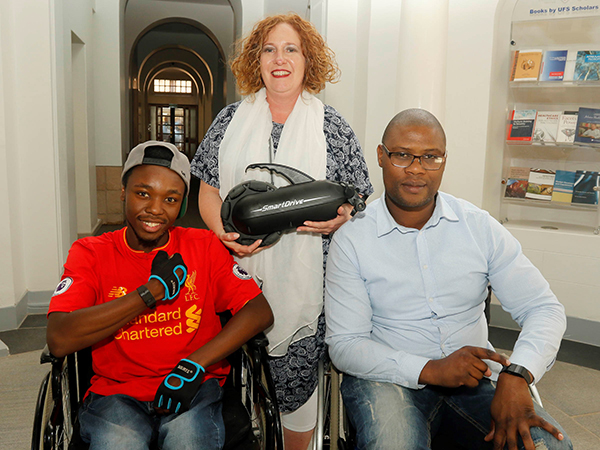Latest News Archive
Please select Category, Year, and then Month to display items
19 November 2018
|
Story Charlene Stanley
|
Photo Charlene Stanley
 Prof John Mubangizi, Dean of the Faculty of Law, encouraged delegates at the Fifth Annual International Mercantile Conference to share ideas on best international practice in their various fields.
Prof John Mubangizi, Dean of the Faculty of Law, encouraged delegates at the Fifth Annual International Mercantile Conference to share ideas on best international practice in their various fields.
“Don’t say anything online that you wouldn’t want plastered on a billboard with your face on it.”
This famous quote by international tech expert Erin Bury should be a guiding light when it comes to online habits in the workplace, according to Francois Cilliers, UFS Lecturer in Mercantile Law.
In his presentation Could Social Media be the Gateway to Employment Discrimination? he warned that employees have a responsibility not to bring their employers in disrepute through their comments on social media.
“Posts, updates, tweets, and comments are considered to be publications and can therefore never be seen as privileged information,” he explained.
Responsibility on employees and employers alike
He pointed out that employers also had a responsibility regarding the way in which they use the information about prospective employees obtained via social media.
“Nowadays, approximately 75% of companies hire through social media. In the US, recruiting companies spend hours researching candidates, making full use of what they can find on social media. It was found that 50–80% of employers frowned upon posts and pictures featuring drug and alcohol abuse, profanity, and bad grammar.”
He warned that employers needed to tread lightly, as a decision not to employ someone as a result of information on the prospective employee’s political views and sexual orientation could constitute unfair discrimination as set out in the Employment Equity Act.
“An employer who wishes to use a screening process (utilising social media) has to prove that the information and the process is objectively necessary and can be justified with reference to the inherent requirements of the job,” he explained.
“As technology and electronic systems advance, so too should the applicable labour laws.”
Cilliers’ presentation formed part of the Fifth Annual International Mercantile Law Conference recently hosted by the Faculty of Law on the Bloemfontein Campus.
Incorporating new technology in teaching and research
“This conference is an opportunity to share ideas on best practice in what is perceived as a ‘difficult’ field within Law,” said Prof John Mubangizi, Dean of the Faculty of Law, as he opened the proceedings. Topics in the discussion sessions ranged from Racism in the workplace and The underrepresentation of females in the judiciary, to Decriminalisation of cannabis: A recipe for healthy employer-employee relations?
“Conferences such as these help us to take advantage of the newest developments in technology to advance our teaching and research,” said Prof Mubangizi.
“To quote Einstein: ‘We can’t solve problems by using the same kind of thinking we used when we created them.’”
SmartDrive devices give UFS wheelchair users more independence
2017-12-01

From the left, are: David Mashape; Martie Miranda, Head of the
Center for Universal Access and Disability Support at the UFS;
and Lawrence Qamba, celebrating the recent acquisition
of two SmartDrive Power Assist devices.
Photo: Johan Roux
Students who make use of wheelchairs at the University of the Free State (UFS) will now be able to move around campus more independently than before. This is thanks to two SmartDrive Power Assist devices acquired by the university.
Accessibility is very important to the institution and with these devices clipping onto a manual wheelchair to make it motorised, students will not have to ask for help that often. It will assist them in overcoming obstacles they face every day.
Different surfaces pose different challenges
According to Martie Miranda, Head of the Center for Universal Access and Disability Support (CUADS), one of the most important advantages of the SmartDrive machines is that it enhances the independence of students. The devices were bought with funds received from the Department of Higher Education and Training specifically allocated for accessibility and infrastructure.
“While the UFS is addressing inaccessibility on its campuses, which will take time, this will help to motorise wheelchairs for wheelchair users to move around more easily. Students can now move around independently without necessarily asking for help, for example, to get up very steep ramps.” Miranda says some surfaces, such as grass and gravel, has its own unique challenges for wheelchair users.
A few years coming
The SmartDrive devices are operated by a Bluetooth watch. By tapping twice on the chair or clapping twice, the motor propels the wheelchair forward and stops when tapped twice, while also braking with one’s hands. The speed can also be controlled by the user. The machines use rechargeable batteries, with a fully charged battery lasting up to 15 hours.
Acquiring the devices was a process of a few years, and CUADS is happy to finally employ them to the benefit of their students. Miranda says the determination and support of Prof Nicky Morgan, Vice-Rector: Operations, and the assistance of Nico Janse van Rensburg, Senior Director: Top Management, were instrumental in buying the devices.